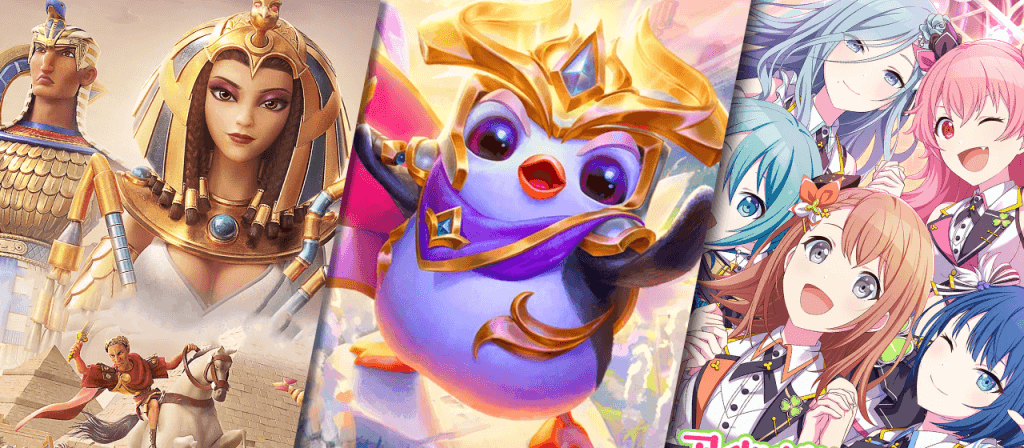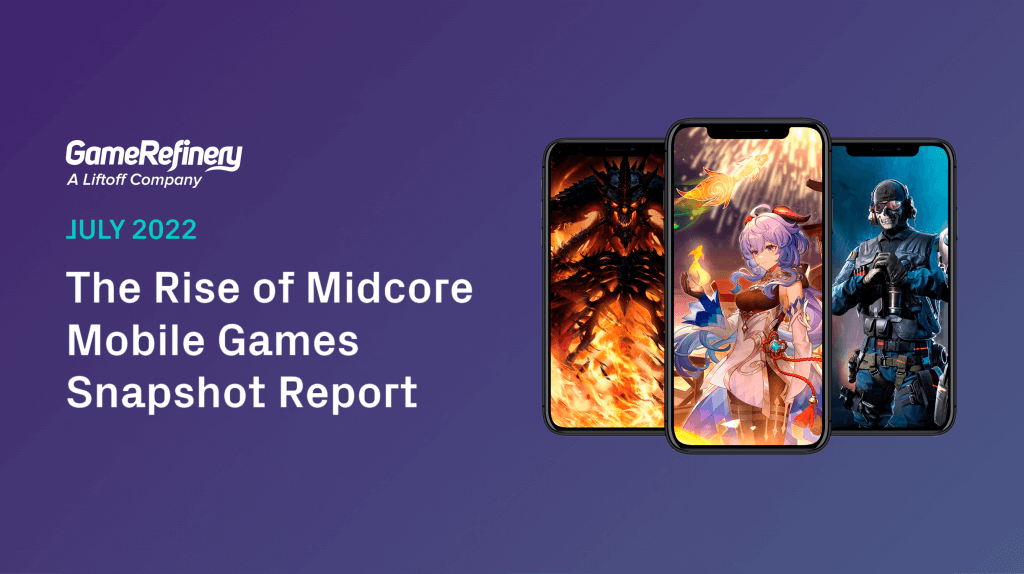In this episode of the Mobile Gamedev Playbook, Kirill Petruk, Lead Producer at Ten Square Games, talks about the development of Fishing Clash: Sports Games and other realistic life simulation games with GameRefinery, a Liftoff company analyst Teemu Palomäki and our host, Jon Jordan.
![]()
![]() Spotify, BuzzSprout, TuneInRadio, iHeartRadio
Spotify, BuzzSprout, TuneInRadio, iHeartRadio
– If you enjoy the episode, remember to hit subscribe!
We discuss the inspiration behind Fishing Clash, the realistic gameplay it provides, the social elements, and the collaborations it has had.
You can also watch the episode on YouTube:
Topics we will cover in this episode:
- Introduction
- Finding the balance between real-life simulation and actual gaming
- Let’s Fish and Fishing Clash
- Key audience
- Offering players new and surprising experiences through liveops
- Monetizing through multiple gameplay layers
- Battle Royale in a fishing game
- MVP approach to designing
- Audience cross-overs
- Raisin awareness about environmental issues
Read transcript
Introduction
[00:01:10] Jon Jordan: Hello and welcome to the Mobile GameDev Playbook. Thanks for tuning in for another episode. This is a podcast all about what makes a great Mobile Game. What is and isn’t working for mobile game designers and all the latest trends. I’m host Joh Jordan, and joining me today is Kirill Petruk, who is the lead producer at Fishing Clash at 10 Square Games. How’s it going, Kirill?
[00:01:25] Kirill: Hello. All good, thanks for having me.
[00:01:27] Jon: Glad you could tear yourself away from the fishing to come and talk to us. That’s going to be the focus of what we’re talking about today. Fishing Clash is a really popular fishing game. As our expert more generally on what’s going on with Mobile Games, we have Teemu Palomaki. How’s it going, Teemu?
[00:01:44] Teemu Palomaki: It’s going great. Great to be here with you today.
[00:01:47] Jon: I forgot to say you are the Chief Game Analyst at GameRefinery, so you are taking the overall view with some data and some analytics, and Kirill is very focused on Fishing Clash. Let’s start with that. Kirill, can you talk a bit about Fishing Clash, how it came about obviously a Fishing Game, but I don’t know, is fishing very popular in Poland, is that just how it came about? Give us the background story.
[00:02:16] Kirill: Well, actually, Fishing Clash itself, it’s a little bit of a PT that wasn’t originally the one who started the whole Fishing Clash game years ago, but from what I know, the game itself, it evolved from the previously successful title called ‘Let’s Fish’ and so like what we wanted in Fishing Clash, we wanted to emphasize on the players’ interactions to bring more healthy competition in the game and to make it feel like real-life fishing: you catch the fish, you wait for the catch. You record your trophy, and then you release the fish.
I don’t think the overall fishing scene in Poland is a big thing here. Maybe I don’t know a lot of stuff because I joined the company recently, but Fishing Clash was the next step in growing our line of hunting and fishing games inside the company.
[00:03:10] Jon: Teemu, you are interested in fishing. Do we have any anglers on the show? I’m not one, so.
[00:03:18] Teemu: I’ve done some fishing at my parent’s summer cottage in real life. But I really enjoy fishing in gaming, like in final fantasy 15 or Nier: Replicant and Automata. I get totally lost in there. Also, when I was playing Fishing Clash, I got sucked in there too, so not a real Fisher but a gamer fisher, for sure.
[00:03:49] Jon: Yes. Fishing is a task in lots of RPGs, isn’t it? There is that interesting not quite sub-genre but a sub-gameplay of having instead of those grindy games, you can also have like a tranquil little fish and get some rewards that way.
[00:04:07] Teemu: Yes, because it’s really relaxing in a way, and that’s what it is at best. It’s relaxing, and it’s all like grinding.
Finding the balance between real-life simulation and actual gaming
[00:04:15] Jon: Okay. Kirill, so obviously, as far as I understand, real-life fishing is relaxing, but not much happens. So if you were going to make a very realistic fishing game, basically, someone would open the game and look at the screen for six hours, then probably not catch anything, then go home. I guess that’s the fundamental thing is that how you’re making a game about a real-life thing that some people know a lot about, and some people just maybe want to play in a game. You want to have some things that are really realistic, and people go, yes, it’s a great fishing experience, but equally, it’s a game, and you want people to have an enjoyable time and be doing interesting stuff fairly frequently. How do you balance that, how do you choose the important simulation bits, and what can you replace with actual gaming stuff?
[00:05:11] Kirill: First and foremost, what we’re trying to deliver to our players is the real-time, your real-life experience. That’s why our fish are as realistic looking as possible. Also, we’re trying to make the fish behavior as much; how to say? So, how you catch the fish and how the fish behaves in the water is similar to how it would be in real life. It’s like trying to emphasize delivering this real-life experience to our players through the quality of the content we are giving them.
Of course, this was said previously. Just fishing by itself would be more calming and somewhat stale and not that interesting of a process because they just have to wait for the fish to be baited. Then the most important and exciting part is when you reel in the fish, but in between, you just have to wait like in real life. Here we’re trying to make it more exciting by, first of all, giving the additional competition layer to the players so that they can compete in different challenges, they can compete in duels, and challenge one another. We also have specific clan features in the game that allow a bigger group of people to contribute to some specific clan goal. Bringing this additional social interaction to the game helps keep our people more interested in the game.
This gives an additional layer to real-life fishing as we all know it. That’s the whole case. Also, due to the live ops events that we are constantly delivering to our players on a day-to-day basis, we’re trying to make and push this content and this interest for the players even further. This is also the biggest part of our game. That’s LiveOps and all daily and weekly events that we’re having.
Let’s Fish and Fishing Clash
[00:07:03] Jon: There’s some good things I’m writing down there to talk about later, competition and social and clans and stuff. Actually, maybe it’d be good to take a step back. You mentioned that the first game was Let’s Fish, and Fishing Clash came out of that. What’s different between Fishing Clash to Let’s Fish? I guess what I’m thinking about is, Let’s Fish was released, people were playing it, and then clearly, you thought we need to do another fishing game. What was that? What was different there? What features were you concentrating on in the new game as opposed to the other game?
[00:07:42] Kirill: This is exactly this competition layer that we’ve been adding. Let’s Fish is more than just about the fishing itself. It’s just about having a good time in a good environment and having this chill experience that you can just go do it, and you don’t have anything that’s bothering you. It’s just you, your rod, and the fish you’re catching. Why it’s called Fishing Clash is because we’ve added this competitive level to the game that you can actually compete in different locations with the players.
This brings additional joy to the players. It pushes them to excel in their fishing skills even though it’s on a mobile phone, but it still gives additional excitement. That’s the whole point of this evolvement that we took. We took the best that we knew from Let’s Fish and everything that was successful in it. We brought this additional layer of competition, and that’s how Fishing Clash was born.
[00:08:39] Jon: It’s just really taking the fundamental gameplay then adding the social stuff around it. I should point out, it is interesting, we’ll talk a little bit about this. You mentioned skills there, and I think it’s– so I played a bit of Fishing Clash, and what’s interesting is the opening experiences; you rock up there, and you cast your rod, and then you catch something very quickly. Then you’re tapping to keep the line-caught, and it’s almost like a rhythm action thing. Again, something we see a lot in touchscreen games.
There is skill in there in terms of getting that right, but I can do it. It’s not too skilful. There’s an element around that, what you’re actually doing on the screen. Then how does the other skill stuff start coming in? I’m imagining you’re going to have different rods, different baits. How does that all play together? Because obviously, people are playing in a clan. There has to be some real level of skill there. It can’t just be randomly tapping a button at the right times. Obviously, more of these people are going to play. They’re going to want more and more skill-based elements as they get deeper into the game.
[00:09:46] Kirill: Well, yes, of course, other than just stepping on the button. First of all, there are two modes from which you can switch the UI and how you’re operating the game and controlling the game. The first one you saw was tapping the button, and another one which brings additional joy to the game is the slider. The slider shows how far and strong you want to pull the rods, and actually, with the slider, once you switch to the slider, it gives you a completely different feel of the game and becomes more real. There’s another feature in other areas that we have around that.
We have the skill tree, for example, the one that is dedicated to a specific fishery. As you play longer and longer in the same fishery, you obtain some specific fishery skill tokens. They can allocate along the skill tree in order to increase some chances for some specific fishes or like for example, to increase the booster value for some specific fishes or for some specific boosters.
This is what changes. Well, this is what gives the bigger impact on the fish and on your contribution to some clan goals or to the scores that you get in the duels or in the challenges. This is an additional layer that we have, and also of course, you upgrade your rods, you upgrade your lures, you upgrade your fisheries, and this gives you also really nice benefits, and it gives increases the chance of getting a rare fish or getting a bigger fish than your opponents or just winning in some specific battle royale event, for example. That’s what it is.
[00:11:27] Jon: I was playing the new mode. I didn’t get to the expert mode.
[00:11:33] Kirill: Well, probably you should. Try and switch to the slider. I guarantee you will have a completely different feeling of the game.
[00:11:43] Jon: Teemu, how did you find the fishing experience? Was that realistic enough?
[00:11:49] Teemu: I really enjoyed it because it’s so simple. It feels challenging, and in real-life fishing, you don’t really know what fish you will catch. Sure. You can affect it with lures, but I believe there can be still different fish catching the hook than you expected and the luck element in the game. I feel like it works for that. Just the way it’s simple, I feel it’s approachable to all audiences, but it still works for someone like me who likes playing a bit more complex games as well, and the customization option that you can change to more challenging the controls. I think that’s a really great way to make it appealing to a wider audience.
Key audience
[00:12:53] Jon: That plays back to what we’ve seen. I think the success of free-to-play mobile games as a genre now, the single biggest part of the games industry is because often even the most complex games in terms of the meta are fairly simple in terms of when you start off, there’s a thing you do, and that’s using a touchscreen, so that’s going to be fairly simple. But then that may change, and certainly, the meta can get incredibly complex in terms of assets that you’re accumulating and obviously, then that plays into the guild. We’ll talk a bit about that as well.
You have that simple but challenging balance, and obviously, that also plays into monetization. We’ll talk a bit about that, but before we go into that, I think Kirill, we haven’t really mentioned the size of the game, so maybe it’d be good to put some numbers around how big the audience for Fishing Clash is and is there any geographic limitations? How does it play out globally in terms of where your key audience is?
[00:13:57] Kirill: Well, it’s of course, the US, is the biggest market. This is a common thing. We have a lot of people playing from Europe, and we also have a dedicated application for the Chinese market, Fishing Clash China. This is something that we did in collaboration with NetEase, also our publisher. They have their own specific market but are also trying to reach this market. This is something that we did not so long ago and are still trying; we are finding ways to treat this market and how we want to proceed. It’s not that much of a difference from other games of other genres.
[00:14:39] Jon: Do you have a good idea of what percentage of your players are regular people who go out fishing in real life?
[00:14:49] Kirill: That’s a tough question. The thing is that from what I know, our VIPs, like the players that are most engaged in our game, are real fishermen. We also have some big YouTuber fishermen that are big VIPs in our game. They enjoy our game and we’re getting their perspective while we’re building the new features and thinking about the new content that we want to put in the game, so we’re communicating and talking to these people constantly. Also, we have some really passionate fishermen inside our company. We’re also getting their perspective on what they would like to see in the application and what they think our players would love. Yes, we have this also.
Offering players new experiences through liveops
[00:15:33] Jon: You previously mentioned LiveOps, and I guess that is– Once you– For any free-to-play mobile game, that’s how you expand your audience and retain them and certainly monetize them over a longer period. How do you deal with LiveOps? Do you have a very specific timeframe of cadence in which you release new content, and what sort of level of new content?
Is it just sort of new fish or how– I guess you’re a real game, so you’re going into different global locations that–, and I’m guessing different locations are going to give you access to different fish. There’s quite a key element of you want to play this event this week because this is how you’re going to get these fish. You’re not going to get them, maybe for another couple of months.
[00:16:21] Kirill: Well, yes, it’s a little bit different here. For example, the content we are constantly uploading are new fisheries and new fisheries for the already released fisheries. We do this over time and have a regular schedule of these new fishers and new fish coming. Also, we do have some specific LiveOps events for some public holidays.
We want to make something exciting for our players for these public holidays. Of course, we are limited, and we obviously have limitations because we want it to be as realistic as possible with the fish species, the fishing places, the fishing areas, and the fisheries themselves. We need to be wise in deciding which new fishery we want to create and which fishes we want to put in this new fishery because of these species limitations.
Sometimes we just have to recycle some of the fish, we need to renew them, and this is something that we don’t want to do quite often because our players don’t like it, and we would rather not do that. Also, we can be really creative in some LiveOps events for some specific qualities, for example. This gives us a break from working in this realistic matter on the realistically looking fishes and realistic behavior and just have some fun.
For example, we’ve had a gobbler fish for thanksgiving day. We’ve been having count Sharkula for Halloween and joker fish for April’s Fools day. It was amazing. The team had tons of fun designing this feature and coming up with the concept because this is something that you do not do with real fish in the wild, which you just copy and make it look as real as possible.
You create a new fish and a whole new experience for our players that they will not be able to experience anywhere in real life. We’re also trying to give this different perspective and give this different experience to our players during these LiveOps events. We’re trying to balance between the realistic fisheries and real-life fishing experience and these LiveOps events so that our players will not get dull with the game and that they will still have their joy and they will still come back playing.
[00:18:33] Jon: Fantasy fish is interesting but if you have too much of that, it sort of denigrates the fact that this is a realistic simulator game. It’s actually quite, I imagine, a difficult balance to get exactly what you want to do because people have fun, but equally, it’s like, well, you’re not serious enough. You’re not a serious enough fish simulator for me to play.
[00:19:00] Kirill: Yes. As I already mentioned, as we’re trying to get as much real-life experience as we want for our players, sometimes, our players and we as developers need to have a small break to come back with the real fisheries and everything. That’s why we invented new fish species, the one’s that we make for these specific public holidays. That’s why they’re taking place in the game.
Monetizing through multiple gameplay layers
[00:19:22] Jon: How does it work with the clan? I guess single players could just come in and play the game, and maybe you’re going to spend some money and then expect a different time, but with the clans, I guess is where there’s not necessarily your largest audience in terms of actual players, but that’s clearly where your most committed players are.
That’s probably where in free-to-play mobile, that’s where we see the most monetization happening because there’s a social interaction there as well. How do you set those things up? Do they have specific live events for the clans? I guess you want to always have something for the clans to do. Otherwise, they’re going to leave, I suppose, but equally, you don’t just want to be getting them to jump from hoops all the time and overly monetizing them. There’s an interesting balance there between keeping them motivated and spending. But equally, not feeling like you’re gouging the market, which we’ve seen, I guess, historically, in mobile games, some of those big client games had problems around that area.
[00:20:36] Kirill: We’re trying to deliver this additional layer to our players. Of course, we have the single-player mode where you can just fish, have duels, participate in battle royale events, and participate in the challenges of course, as just a solo player. But with the clans, they’re giving an additional layer to all of that. First of all, we have a social layer where you can exchange the lures with the players. You can help some of your clan members to grow. For example, if they start falling behind, you can just donate some lures to them. You can donate some resources to them so that they will not fall behind that much, but we also have a clan match feature. This is actually where the clans are participating, and they’re competing in different leagues.
We have a league in which we have a certain amount of clans, and they are participating there and competing for the ranks inside this league. According to the ranks, they receive different rewards. Those rewards you receive in the clan are huge and are being rewarded to all of the players inside the clan. This helps all players proceed with the game and go forward way, way faster, rather than just playing solo. Still, like you were right, we have different players’ personas. Some of them, prefer playing just solo and not that much interacting with the social aspect of the game.
Some players do not even go into duels and are not participating in the challenges. They just enjoy the fishing experience and the calmness of just having you, your rods, and the fish you catch. Each and every player can find something for himself in our game. This is what we’re trying to deliver, this diversification to our players so that it’ll be enjoyed. That they will be able to enjoy our game from different perspectives.
Battle Royale in a fishing game
[00:22:40] Jon: Something else jumped out at me there. I’m going to go to Teemu for this one. We’ve often looked at how genres and modes spread out in previous podcasts, but were you expecting Battle Royale in a fishing game? That’s interesting. I’ll ask about that in a minute, it sort of came about, but that shows, doesn’t it? Where we have a game genre that exploded onto the scene. Suddenly, over a period of time, it gets hybridized into everything. No game now that couldn’t have a Royal Battle mode. [laughs]
[00:23:03] Teemu: Yes, definitely, the hybridization of genres is a real thing. There are a lot of weird mixes. You have your fours Xs with your Match-3 Mechanics, and well, Match3 Mechanics also in Idle RPGs, like AFK Arena, and just merge mechanics, and 4Xs, whatever. So, people are bringing different genres, and players are playing different genres. Basically, you’re not aiming for just the people who play fishing games, but you need to widen the net right now to be able to get those players that might enjoy some different features. It’s definitely worth looking into different kinds of genres, and seeing if there’s something that sparks some inspiration in your mind, and see if that could fit in into your game. It’s definitely interesting.
[00:24:01] Jon: Because there are so many mobile game developers out there now, and try so many different things, that it does make sense. When everyone knew that Candy Crush was massive, but you couldn’t just do another Match3 game because how are you going to compete with them? Obviously, adding Match3 games with building mechanics, and you have to play rigs, and all the explosion in that, and then people understand, we have Match-3 in building, and then you get the hybridization on top of that as well. You can see for the audience, the audience is excited that there’s a basic thing they understand, but it’s mixed up. I guess, without getting into cooking different ingredients, Kirill how does Battle Royale fishing go? That seems interesting.
[00:24:42] Kirill: Yes, just as we’ve been thinking about that in different competitive layers. Again, we’ve decided, so why not Battle Royale? You just have a specific amount of people, and whoever comes up to the challenge, this person will be at the top, and this person will receive good rewards. We also have some places, the first place, second place, and third place up till the fifth, sorry, up till the fourth place, people are getting rewarded with some rewards, but this mode is rather successful.
For example, I’ve been using this a lot while playing and while levelling up the game because like I’ve been managing some specific fisheries in order for me to excel at these fisheries and the events that we’ve been having on these fisheries and I was not like missing any Battle Royale events on these specific fisheries because I was almost the best, because I’ve been like maintaining. It’s a matter for me, just to show up and just to fill up my inventory with the boosters and whatnot in order to proceed in the game further on, and all the testing is really nice.
Yes, it gives additional diversity to the players. If they don’t want to play Battle Royale, they’re not forced to play it because it’s just a separate mode that they can enter. They can also skip it if they would not like to be playing this. We’re just trying to deliver a different experience with different players. That’s what we do.
MVP approach to designing
[00:26:04] Jon: In terms of where you are, as developers, you always have this sort of short-term sort of things that you do more in the live ops thing, and then you have more medium-term, long-term things to say, adding new features. Is there anything you can talk about because of what you’re looking to do there because again, I guess it comes back to balance that there’s a lot going on in the game with live events, and people sort of get quite committed to a game they’ve been playing for a while.
I think my impression seems to be that for some mobile games, they sort of get to a point where they’re maybe not quite jumping the shark but still, they want to show that they sort of can make radical changes in the game or add quite new and big features. Often those whilst are really interesting, to a certain set of players can then actually be quite off-putting to people who have played the game for a while and are quite happy with what it is? I don’t quite know whether you’re having those big changes yet, but maybe talk a bit around what’s going to happen in balancing, short term and long term.
[00:27:07] Kirill: Of course, we’ve changed a bit of the approach since I joined. We’ve implemented the MVP kind of approach to our features. Each and every feature that we’re doing, we’re trying to find the minimum valuable thing that can be from different kinds of perspectives, from product perspective, over temp technical perspective, we have relatively short iterations or like our sprint’s are running in three weeks, and each sprint, we’re releasing something valuable and something meaningful to production, in order for us to validate it. We’re validating each and every feature, the one that we’re having, it can be AB tests with the actual players, it can be just internal play tests within the company, it can be played with a specific group of VIPs.
Like, for example, if you want to get their perspective as well and after several iterations of polishing, AB testing, refining, and making changes and adjustments to the features. This is how we’re delivering the best feature for our players, the one that they will be able to enjoy. It’s not an easy process, though, because we need to do a lot of work in pre-production, because production is really fast. Like in one sprint, we are able actually to deliver the research that we have with our structure to deliver something meaningful to production. But in pre-production, as I’ve mentioned previously, we need to spend a lot of time with a feature evaluation, like defining the high-level design of the feature and putting this feature through the whole pre-production pipeline where we have a lot of steps actually, that we’re taking.
Even though like, we have this approach, and even though we are making this big process of pre-production, still, once we release, the MVP of the feature changes might come because we were really trying to be flexible here and we’re trying to be super reactive to the player needs, and to what players like in the game. And that’s exactly why we have these short iterations and why we’re giving ourselves a space to make changes.
That’s the whole point. Big changes though, the ones that we’re having, we’re discussing them even more in detail. We’re trying to polish them as much as possible from different kinds of aspects and from different kinds of perspectives, but yet again, it will be play-tested. It will be AB tested a numerous amount of iterations before it reaches the whole production or the whole population of our players.
[00:29:35] Jon: I guess as an outsider sort of looking into TVs I always find it fascinating how again, with this live ops sort of situation with free-to-play mobile games, it’s how much work sort of now goes into games that potentially is never seen. I think it wasn’t that long ago that everything developers worked on got shoved in the game because we built it. Whereas now, one, I think you can do a lot more testing, and two, in a good way the power has shifted quite a bit, I think, from developers to the people playing the game because they’re the ones who are putting the time in. They’re the ones putting the money in, and developers can see immediately what any change does to these long cohorts that they’ve been looking at.
It’s quite fascinating how it’s almost switched on its head that, I think the developers to be working on something for six months and then AB test it and then suddenly, well, we’re not doing that. We’re going do something else, and the player base will never know anything about it.
[00:30:29] Kirill: Also, by the way, we’ve been there, to be honest. This is exactly why we did this change because there are some features that I honestly think are amazing. They can be inside our game, but for some reason, we spend a lot of time making these features. We did one or two AB tests, and we saw that maybe this feature is not so good, and we just decided to move forward with the next features not coming back to this feature and maybe like running another AB test and trying to put it back to life.
We’ve decided that we cannot spend more time and want to proceed with the MVP idea by evaluating this idea in production and checking if this is something that will work, if this is something that our players will like, and if this is something how we want to push our game forward. That’s the whole idea of how we came up with this MVP approach.
[00:31:22] Teemu: Yes. One thing that came to mind like the many games or some games that I’ve seen have been testing new features as non-recurring events in the game. Whatever they build, they bring to the game as a one-time event and get some player feedback and get the statistics of who actually engages with the event. Then they run maybe a survey after the event and see what feedback they get.
Suddenly, maybe like four months later, you have a similar event but slight changes based on player feedback. Suddenly they bring that event as a permanent feature. That’s something that we’ve also seen a little bit.
Audience cross-overs
[00:32:16] Jon: Yes. Much more holistic approach. I guess, yes, playing into the power of the community to not even consciously shape development, but just by all this testing that you’re doing all the time. Cool. Maybe to finish up, Kirill I don’t know how much you can talk about it, but it’s interesting that in Ten Square Games, you have these fishing games and some hunting games. Is there sort of a large crossover to that? Obviously, that’s another outdoor sports simulation thing. Are there people who play both, or are the fishing and hunting communities quite different?
[00:32:54] Kirill: What I would say, well, obviously, there are players that are playing both of these games because they’re quite similar in the way how they feel. As a company, we’re trying to deliver this experience to our players indoors. Well, they can go outside and they can try it in real life and do it in real life if they want to. We’re trying to deliver this for them so that they will be able to play it on their phones and get a similar experience. We’re trying to keep it this way. Obviously, some players playing Hunting Clash, for example, are not that big fans of fishing and vice versa.
For example, people who prefer fishing over hunting, just don’t want to hurt wild animals. It doesn’t really matter in real life or in mobile games. It’s something that’s not appealing to them. That’s why they’re picking this fishing game because in fishing games and competitions, you catch the fish, weigh it, and let it go. You don’t need to kill the fish unlike in hunting, for example. It’s not so violent if I might say that. It’s a different audience for different games. Also, we have some other games in this clash, let’s say, genre, the ones that we will release really soon.
They will be targeting a different audience, and we’ll want to see and evaluate how that would be. We’re trying to expand this genre of hobby in the pocket type of games and clash games with competition around this hobby as much as we can because we seem to be doing a decent job with that, and we want to continue doing it. That’s the whole plan.
Raisin awareness about environmental issues
[00:34:46] Jon: That does remind me that you’re putting the fish back because you’ve done quite a bit of promotion around ecology and that general sort of thing. Can you talk a little bit about how you’ve approached that?
[00:35:00] Kirill: Yes, of course. We had a collaboration with Ecosia and Paying for the planet. We’ve been having an Earth Day in April this year. There was a specific event that we’ve created inside the fishing clash, and there was a specific event that was created in Hunting Clash. I can talk more in detail about the Fishing Clash event because I’ve been involved in this a lot. We wanted to raise awareness and emphasize the plastic waste pollution problem.
Some researchers say that Amazon is carrying around 60k tons of plastic trash annually in the Atlantic. We have an Amazon River fishery in our game, and we decided to want to play around with it. We flooded this fishery with plastic garbage, and as the players were participating in these events and catching some of the trash from the river, the river was getting clearer and clearer. They were getting different rewards as they were progressing through all these milestones. We’ve had a lot of fun with this also. Also, we’ve added a specific boss fish: it was a rubber boot fish, but it was not announced, and it was a complete surprise for the players. It was a one-time-only event for this fish that they could catch.
It went explicitly well, and it was super good. We’re super proud of our players’ interest in helping the environment. We saw the increased player engagement, veteran players, and the positive impact on the new players who took an interest in the event. It was a win-win event for everyone. The players enjoyed playing it, we enjoyed making it, and we managed to make a positive impact on the world with it. I think it’s really important and it’s a company statement that we want to continue doing such actions at least one, two times a year. We’ll be participating in more occasions, such as this in the near future.
[00:36:48] Jon: That’s great when you’re combining a meaningful real-world event with something as fun as a rubber boot fish. [laughs] It’s a surprise rubber boot fish, [laughs] as well. That’s great. Cool. Good. Well, thank you very much, Kirill, for going through in such detail about what’s going on at Ten Square Games in Poland and what’s going on with Fishing Clash. I recommend people to download it and have a play. Thank you as well, Teemu, for your expert opinion. Thanks, guys.
[00:37:19] Kirill: Yes, thank you, John. It was a pleasure.
[00:37:22] Teemu: Thank you.
[00:37:22] Jon: Thank you, of course to you, for watching and listening to the podcast. Remember, the Mobile Gamedev Playbook is always talking to the people who are building some of these enormous free-to-play mobile communities, communities of developers and gamers, and really coming up with some fascinating new products that the hybridization theme continues to move. I’m sure we’ll talk about it for many podcasts to come. It’s really fascinating again to think, so please subscribe to us, so you don’t miss anything. Thanks for listening. See you next time.




















